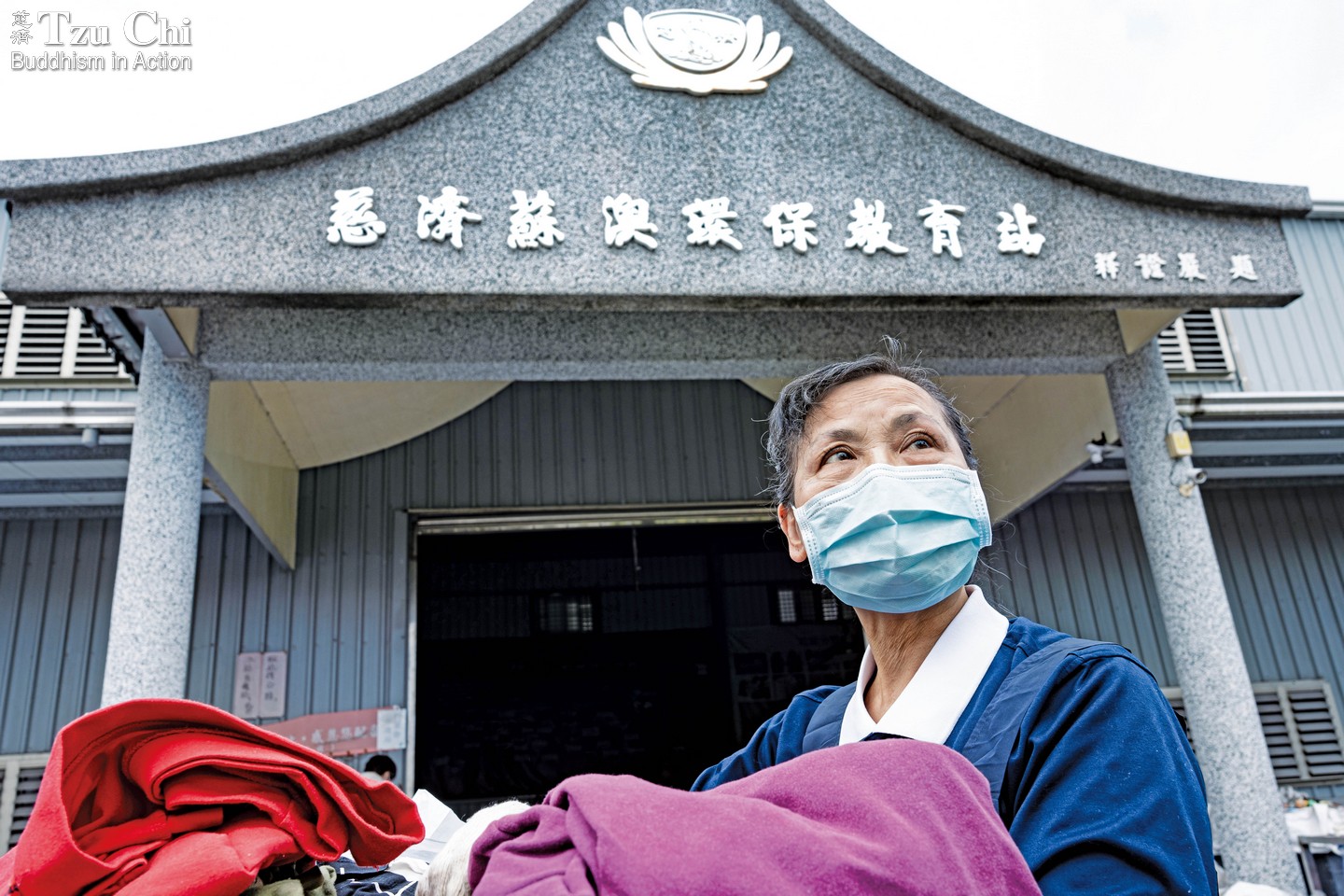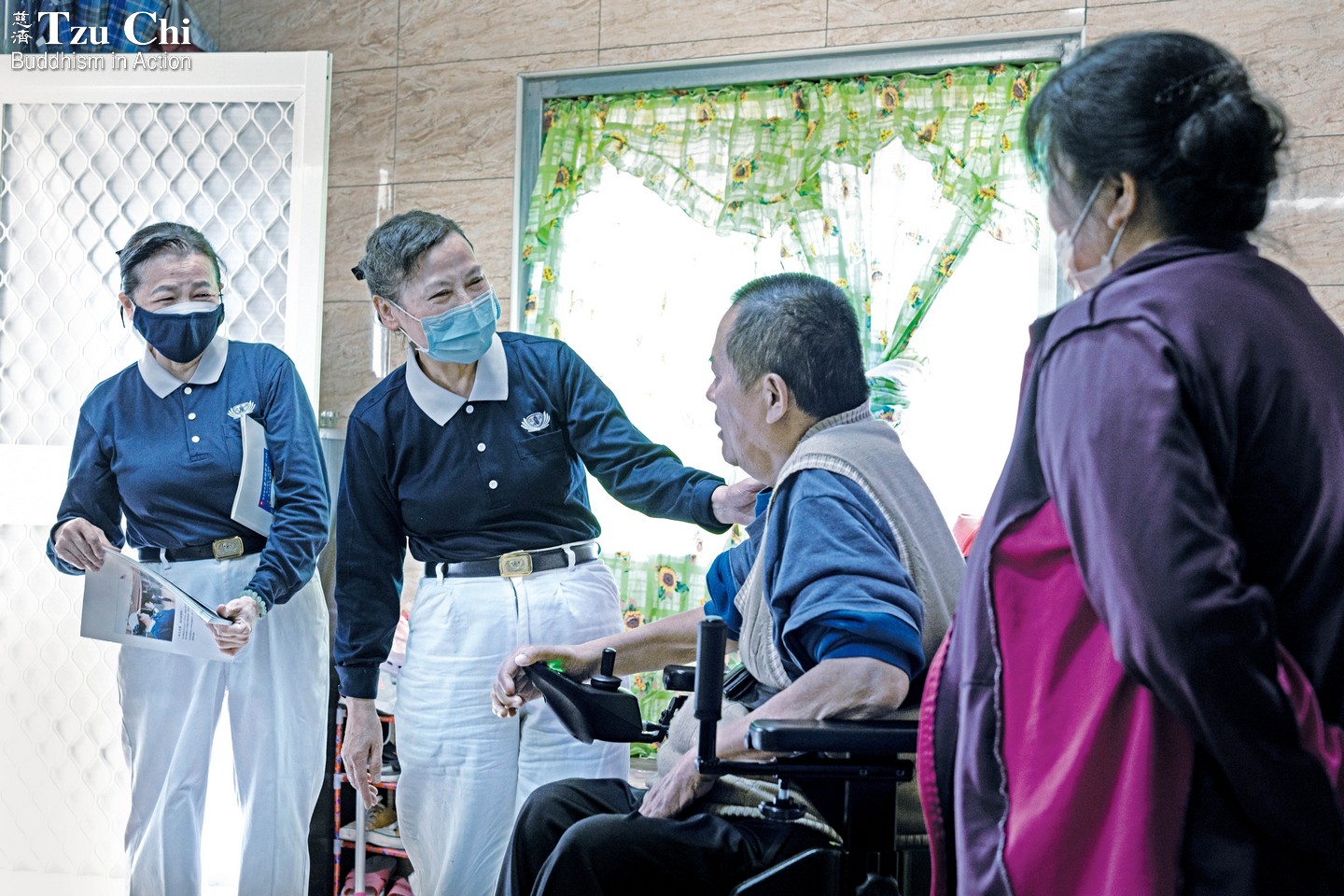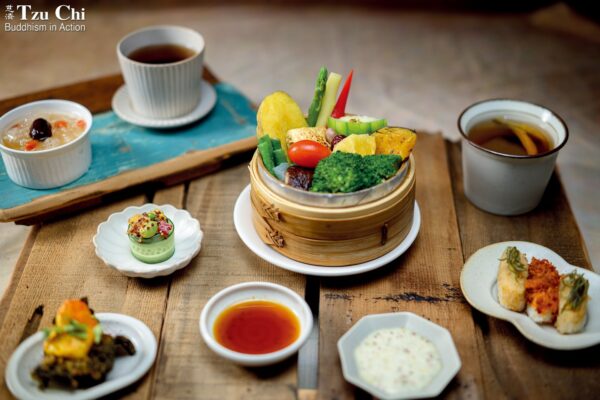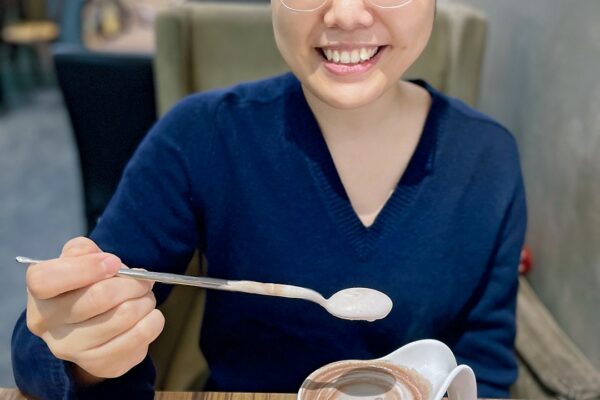By Liao Zhe-min
Translated by Wu Hsiao-ting
Photos by Hsiao Yiu-hwa
She has been visiting the needy for more than 30 years and has met a lot of people who have had a tough life. Those experiences helped her untangle some painful emotional knots that had kept her heart from being free.

Lin Su-yu is a senior Tzu Chi volunteer living in Su’ao, Yilan, northeastern Taiwan. She has visited the needy for more than 30 years.
It was springtime. A light drizzle, accompanied by a breeze, was falling in the Lanyang Plain, in Yilan, northeastern Taiwan. A married couple, Lin Su-yu (林素玉) and Xu Shan-bao (許杉寶), was accompanying a group of fellow volunteers to visit some Tzu Chi care recipients.
The party came to a brightly painted sheet metal house, fronted with flowers and other plants. This was the home of Mr. Cai and his wife, though it was not how Lin and Xu remembered it. “It looks so different now!” the couple said with one voice. When they saw Mr. Cai, whom they hadn’t seen in a long time, they asked, “How have you been? Do you remember us? We visited you many years ago.”
Lin and Xu are both senior Tzu Chi volunteers with many years of experience visiting the needy. They used to visit families in the mountains, but they gave that responsibility many years ago to another group of volunteers when they started making home visits to the needy in Yilan’s urban areas. On this day, they were accompanying that group of volunteers to visit some households on their old route.
Mr. Cai gradually recalled the couple. “I remember you now,” he said. “You are the Tzu Chi brother and sister who worked in a post office. It has been almost 30 years, but you still remember and come to visit me! I’m so grateful!” He continued with a sense of humor: “I never got very far in school, nor am I highly placed in society, but so many people still think of me and have come to visit. I’m so blessed.”
Carried back in time, they began to reminisce about the past. Lin praised Cai for being able to operate his power wheelchair now and for taking better care of himself. She was also glad to learn that Cai’s wife now has a part-time job as a home care provider, and that they are doing better financially. “Take good care of yourself. We’ll see you next time,” Lin said to the couple as she prepared to leave with the others. After bidding farewell, the volunteers made their way to another household.
Stepping beyond her family life
Lin’s parents started out as fishmongers in a market. Later, her father switched to driving a delivery truck to support his five children. Lin tested into a commercial high school after graduating from junior high. She excelled in accounting and abacus math. After making it through high school, she passed a civil service examination and began working in a post office. Her future husband worked at the same post office, which is how they met.
After they were married, they lived with his mother, who cleaned homes and washed clothes for a living. Lin’s mother-in-law had a taste for alcohol and would develop a quick temper when she had too many drinks. To prevent her from getting angry, Lin helped her wash clothes. Lin was very busy at work. After a hectic day at the post office, she returned home to cook, do the dishes, then go to a stream to wash clothes. It was usually ten by the time she returned home. “I was under a lot of pressure when I lived with my mother-in-law,” Lin recalled. “I didn’t know how to regulate my emotions, and I lost a lot of weight. I became very emaciated.”
In 1983, Feng Yu-xia (馮玉霞), a post office co-worker, began taking Lin to a local suburban temple twice a month. They would listen to Dharma talks and eat vegetarian food served by the temple. At around that same time, via her work at the post office, Lin met Mr. Huang, the father of Dharma Master De An (德安) at the Jing Si Abode. (The Jing Si Abode is the Buddhist convent founded by Dharma Master Cheng Yen in Hualien, eastern Taiwan.) As a result, Lin heard a lot of stories about Tzu Chi, and she became a donating member. She was later trained and became a certified Tzu Chi volunteer.
Because of her work, she could only take part in Tzu Chi activities in the evenings or on the weekends. Her volunteer work included visiting the needy in Su’ao and Nan’ao, both in Yilan. Nan’ao, which is the southernmost township in Yilan, covers a large mountainous area. On the days when Lin, her husband, and another volunteer couple, Xie Lai-wen (謝來文) and You Qiao-ling (游巧玲), were making home visits to needy households in Nan’ao, they’d rise at the crack of dawn and pack their lunches before driving to the township. They could visit about 20 families at most in a day, which included those already on Tzu Chi’s long-term care recipient list and those newly referred to the foundation for help. At noon, they’d have a short lunch break at a pavilion near Aohua Village before continuing on their way and carrying out the rest of their visits.
Lin recalled that Mr. Cai, the care recipient mentioned at the beginning of this article, had had a high-voltage accident when he was younger, which had resulted in damage to his spine and caused his hands to atrophy. Tzu Chi decided to donate a brand-new power wheelchair to him to help him get around. When Lin and other volunteers visited him to deliver the wheelchair, they saw how difficult it was for Mrs. Cai to move him out of bed. That led the foundation to donate another piece of equipment—a mechanical lift—to make it easier for Mrs. Cai to care for her husband. The couple was good at repairing electrical appliances and other household items, so they made a small income by assembling stereos and fixing furniture and other items for people.
Another family Lin and the other volunteers visited on this day consisted of a sick father and his children. The single father did odd jobs to support his family. Their house used to be in such ill repair that when it rained outside, it rained inside too. Volunteers arranged for repairs to the house so that it could protect the family from the elements and allow them to live more comfortably.
“Seeing so many people hard pressed to get by has made me reflect on my own life,” Lin remarked. “My husband and I are free of any financial worries, and we even have the ability to volunteer to help others. I’m deeply grateful for that, and deeply contented.”
Lin’s work with Tzu Chi even helped her untie the knots in her heart about her relationship with her mother-in-law. When she had first joined Tzu Chi and was invited to share her story in small volunteer gatherings, she’d often burst into tears before getting to that part of her life that had brought her a lot of pain. “My time in Tzu Chi has helped me let go of a lot of things that used to trouble me,” Lin explained. “When you have encountered so many poor, sick, and underprivileged people and realized that many people are worse off than you, you stop obsessing over many things. I stopped putting all the blame on my mother-in-law—it was the alcohol that made her emotionally unstable.”
In the latter stage of her life, her mother-in-law was diagnosed with diabetes and quit drinking as a result. After an amputation due to a complication of her diabetes, she required assistance with her daily living activities. Lin helped care for her. Sometimes when she was cutting her in-law’s hair or sponge bathing her, she could see she was in a really good mood. Lin realized that nothing in life is so hard that you can’t transcend it. All it takes is a change of mindset, a shift in perspective, for you to become more cheerful.
Never Give Up
An Interview With Lin Su-yu
Compiled by Liao Zhe-min
Translated by Wu Hsiao-ting
Q: Supplying financial aid is not the be-all and end-all when it comes to helping needy families. Sometimes money can’t improve their lives. What else can we do for them?
A:In helping the underserved, we need to be flexible and provide the kind of assistance that suits the circumstances of the case best, instead of assuming that monetary subsidies are all that is required.
Some aid recipients, for example, fail to make good use of the money we give them: they might spend it on drinking or gambling. When that happens, we need to quickly adapt by giving them daily necessities or other needed items instead. No matter the behavior of the aid recipient, we still want to help meet the financial needs of his or her children—for example, by subsidizing their school fees or daily living expenses. At the very least, we need to make sure the youngsters are fed and clothed and can go to school. If they study out of town, we help with their rent, too.
Even though we do what we can to help, sometimes tragedy strikes—for example, one time the older daughter of a family receiving aid from us committed suicide. This unfortunate event prompted us to think about how we should have paid more attention to the children’s emotional needs instead of just helping the family get by financially. We realized we needed to learn how to better interact with the children of a family.
It is a comfort that the younger daughter of the family has stayed in touch with us. When I ran into her in a post office, she greeted me cheerfully. When she landed a job after she graduated from a junior college, she even sent us a message to share her joy with us.
Even though what we can do for the children of such dysfunctional families is limited, we can at least help the young ones feel that the world is full of love by showing more care and concern for them.

Lin and other volunteers visit Mr. Cai, an aid recipient she used to help care for. She was happy to learn that he and his wife were doing well.
Q:The families you help are usually experiencing very difficult circumstances. How do you adjust your mood when faced with such sad situations?
A:When I visit young people with disabilities or older people living alone with no one to care for them, I often feel so much for them that tears come unbidden to my eyes. But if I allow myself to be swept up in sadness and cry with them, my emotions will get the best of me and I won’t be able to make a sensible assessment of their situation. If that happens, how will I be able to help them overcome their financial, educational, or medical challenges? So, I need to remain strong regardless of the situation. If I feel really, really sad, I’ll hold it until I leave the household to have a good cry.
I’ve been visiting the needy for more than 30 years. No matter how much our society has progressed, or how wealthy we have become, the number of people needing help has never decreased. There are so many suffering people in the world in need of help. No matter how powerless we might feel, we must do what we can to help. We must not give up on any struggling individual or family, or let go of any chance to help them. When it comes to doing the right thing, we should just do it.
Q:With more than 30 years of experience caring for the needy, what do you have in mind to share with new volunteers?
A:For so many years, I’ve always kept in mind what Master Cheng Yen has taught us, about how we need to exercise both our compassion and our wisdom to do good. Simply giving compassionately is not enough; compassion must be accompanied by wisdom. Avoid looking at things on their surface. When we see an able-bodied man, we might ask why we need to help him. But perhaps he has kids at home who need money to go to school or older family members who need care. We must also remain objective, even if we know the needy family we are visiting, even if they are our friends or relatives. We must not allow our personal feelings to sway our assessment.
Even when a case is closed, if need be, we should still visit the household regularly. Sometimes a former care recipient’s children leave home to study or work, and they, facing an empty house, might need company or care. We are the ones who can bring love to them. We should also try to interact more often with the children of a family under our care. If we can help them feel more love from society, they are more likely to be inspired to give to others in the future.



